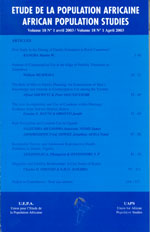
|
African Population Studies
Union for African Population Studies
ISSN: 0850-5780
Vol. 34, No. 1, 2020, pp. 5132-5142
|
 Bioline Code: ep20005
Bioline Code: ep20005
Full paper language: English
Document type: Research Article
Document available free of charge
|
|
|
African Population Studies, Vol. 34, No. 1, 2020, pp. 5132-5142
| en |
Modelling time-to-discontinuation of exclusive breastfeeding: an analysis of infants and under-2 survival in Nigeria
Oyedele, Oyewole Kazeem; Fagbamigbe, Adeniyi Francis & Ayeni, Olusola
Abstract
Background: Regardless of national and international strategies towards promoting exclusive
breastfeeding, only 17% and 35% of infants were exclusively breastfed in 2015 in Nigeria and
Worldwide respectively. Therefore, we aim to estimate average length of exclusive breastfeeding for
infants and under-2, evaluate and predict maternal impact.
Data Source and Methods: This retrospective cross-sectional study applied NARHS data collected via
multistage-cluster random sampling. Count and proportion quantified maternal characteristics, Kaplan-
Meier method estimated length of exclusive breastfeeding whereas Cox Proportional Hazard model
and Wald-test determine and evaluate maternal effect.
Results: Median duration of exclusive breastfeeding was 6.0 months. Locality {P < 0.05 (0.73 - 0.98)}
and place-of-delivery {P < 0.01 (1.06 - 1.19)} were the determinant factors. Cox Proportional Hazard
model fit the data and Wald-test identified main predictors.
Conclusions: Average time at which exclusive breastfeeding was discontinued was six months,
mothers’ locality and delivery-place of infants influence exclusive breastfeeding duration in Nigeria.
Hence, exclusive breastfeeding interventions should target those factors.
Keywords
Infants; Maternal; Exclusive Breastfeeding; Kaplan-Meier; Cox Proportional Hazard; Wald Test; NARHS.
|
| |
© Copyright 2020 - African Population Studies
Alternative site location: http://www.uaps-uepa.org
|
|
